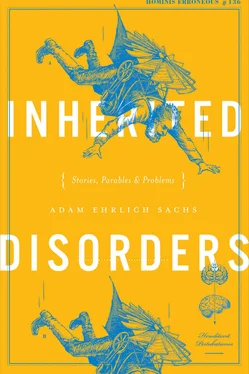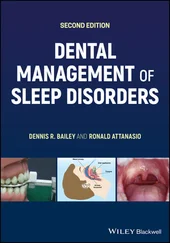But amid all this success, something began happening to his face, and something began happening to his figure. His face was becoming more and more languid. As for his figure, the only word for it, by the time he turned forty-five, was “elongated.” Altogether he was rapidly becoming increasingly sensuous.
The painter tried frantically to hide these transformations. On his face he wore at all times an alert, dynamic expression that was intended to undercut his increasingly languid features. He never allowed the least note of dreaminess to enter his eyes, and he was vigilant lest his fingertips drift indolently along his jawbone. To mask his elongated figure he wore shirts with horizontal stripes, and around his obscenely stretched neck he experimented, for the first time in his life, with scarves.
But no matter what he did, it was obvious to all that he was becoming ever more languid, ever more elongated, and ever more sensuous. “What wistful sensuousness!” others marveled, in whispers, without yet connecting him to Modigliani. Once he nearly lay nude, on a blue cushion, very much like the woman in Modigliani’s Nude on a Blue Cushion , before catching himself, and sitting instead fully clothed, on the couch.
He looked so familiar, everyone said! Who did he look like? They couldn’t place it. He lived the rest of his life in mortal fear of someone finally making the Modigliani connection. But no one did. When he died, of alcoholism, he was the most revered artist of his day. Only at his funeral did it dawn on everyone that he looked, languid in his coffin, like a bad Modigliani. As soon as he was put in the ground, his reputation began to decline.
…………………….
The author of a book of anecdotes or jokes about his father — not this book — got a phone call from him just minutes before he planned to send the book to an agent. The phone call was so pleasant, so unusually effortless and intimate, that the author had second thoughts about his whole project, on which he’d spent years. When he hung up the phone, he burst into tears. He had told his father everything about the project, all of the formal challenges he had faced in the writing of it, all of the hopes he had for it — everything except the fact that it was about him .
The book strove for “honesty,” whatever that might mean, yet now he felt more duplicitous than ever.
So, at the last minute, the author pressed Shift-Command-H to open the Find and Replace window in Microsoft Word and replaced every “father” with a “mother,” every “dad” with a “mom.” He figured his truths about fathers were basically transferable to mothers — who also, after all, come before us and create us and mold our thoughts and who are also disappointed and confused by us when we distance ourselves from them in order to work out which of our thoughts are our thoughts and which of our thoughts are their thoughts, a project which, if we’re completely honest with ourselves, we never make any headway on and which isn’t even our project to begin with because we learned it from our literary and philosophical mothers and fathers (and so, instead of liberating ourselves, we’re just choosing our literary-philosophical parents over our birth parents).
Yes, he told himself, this is about parents . Everything he’d written about fathers applied to mothers, too. We try (and fail) to wrest our heads from our mom’s hands just as we try (and fail) to wrest them from our dad’s hands.
He sent the document to the agent. “A book about my mother,” he wrote.
But the fundamental noninterconvertibility of mothers and fathers was brought home to him moments later when the agent asked if he intended to refer three times on the first page to his “mother’s penis.”
RIVULIDAE
…………………….
In 1863, the Swiss ichthyologist Rudolf Fehrmann, whose theory linking the complexity of freshwater fish to the existence of God had been ridiculed in Darwin’s On the Origin of Species , watched his son, Conrad, set off from the port of Hamburg on a sailing vessel called the Rondelet . Conrad was to restore honor to the Fehrmann name by sailing to Uruguay and catching from the rivers there a tiny freshwater fish of the family Rivulidae , a fish so ingeniously designed, particularly in its reproductive system, according to his father, that it would, his father said, at once vindicate his theory and deal a humiliating death blow to Darwin’s. “Go,” his father exhorted him on the dock, not without tenderness. “Bring me that tiny Uruguayan fish.”
But Conrad was a Darwinian. He had never admitted this to his father, of course, and as he watched the archaic ichthyologist shrink on the dock, waving his arms happily overhead, Conrad felt an indescribable pang. For instead of sailing to Uruguay and fulfilling his father’s mission, he sailed to the nearby town of Wilhelmshaven, where he dismantled his ship, dispersed his crew, and exchanged the name Fehrmann for Pflug.
He never saw his father again.
He did, however, keep up with one or two ichthyology journals, and from those pages he gleaned that his father never lost hope that his son would return with the Uruguayan river fish that would destroy Darwin. Forty years later, when his father was 101 and evolution a settled issue among ichthyologists, Rudolf wrote to the Journal of Fish Biology that his son (“a brilliant scientist in his own right”) would “soon sail into Hamburg harbor with a tiny Uruguayan fish of the family Rivulidae that will create massive problems for Mr. Darwin.” He died a few months later, and Conrad eulogized him in the same journal. “If anything indicates the inadequacy of natural law,” Conrad wrote, “it isn’t the intricate gonads of a Uruguayan river fish but the uncanny faith of a Swiss ichthyologist.”
51: THE UPPSALA SCHOOL OF METEOROLOGY
…………………….
The example of Fehrmann’s son was cited repeatedly in 1938 by the Swedish meteorologist Gustaf Almqvist, father of the Uppsala School of Meteorology, whose son Gunnar disappeared in early January of that year after flying straight into the center of an enormous extratropical cyclone in order to disprove his father’s so-called Uppsala Model of Extratropical Cyclone Intensification.
The elder Almqvist, weirdly unperturbed by his son’s missing plane, explained to the journalists who gathered outside his office that Gunnar had subscribed to the Uppsala orthodoxy on the genesis and decay of extratropical cyclones, but not on their intensification. On the birth of cyclones he was “an Uppsala man” and on the death of cyclones he was “an Uppsala man through and through,” said the elder Almqvist, but on the intensification of cyclones he was “profoundly anti-Uppsala.” On the beginnings and endings of extratropical cyclones you could not wish for a more faithful Uppsala apostle, but on the intensification issue it was hard to find anyone more un-Uppsalian, so much so that in some ways he was actually closer to the Gothenburg School.
The fundamental question was whether air temperatures in the core of an extratropical cyclone were very cold (Gustaf) or moderately cold (Gunnar) compared to the surrounding air. Three months prior, Gustaf had once again reiterated his belief that the core air was “very cold,” Gunnar had replied that the air was only “moderately cold,” Gustaf had called him “a Gothenburg man through and through,” and not a word had passed between them since.
Only now did the elder Almqvist, cocking his head slightly, show a little emotion: “I ought to have said ‘You’re a Gothenburg man on the intensification question , otherwise Uppsala.’ ”
Читать дальше












